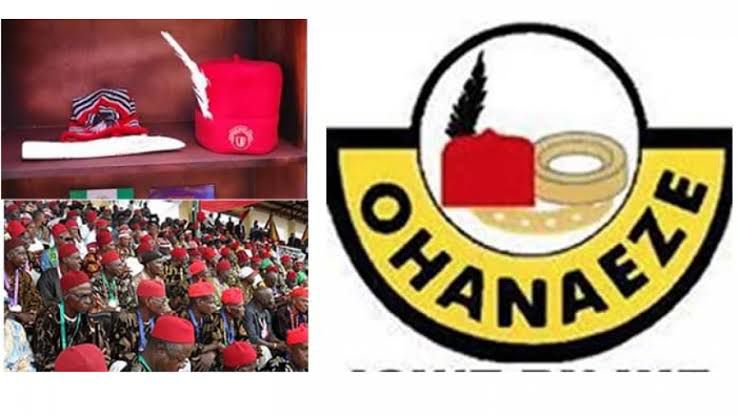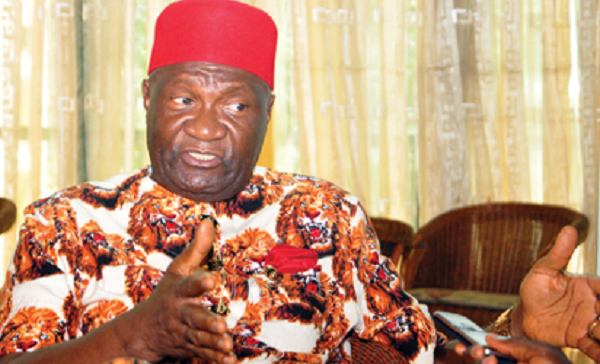Igbo are rabidly republican. When a Yoruba greets a superior, he kneels down. And among the Hausa, they could crawl on the ground to show respect.

IPOB More Relevant Than Ohanaeze Ndigbo – Ohanaeze Youths Lament
Not the Igbo, who show respect, but not to the point of servitude. Probably, the republican claim is because the
Igbo did not evolve centralised administrative systems as was the case among the Yoruba, Edo and Hausa/Fulani, before the coming of the Europeans.
The Igbo obscured republican sense could be seen in the quarrels and infighting plaguing key Igbo associations and institutions, most times resulting in splits/divisions.
At the root of the inability of the Igbo to take their rightful position in the scheme of things in the country is internal disunity.
This could be easily discerned at the individual, village, community and even state levels. It manifests in the inability of the Igbo political elite to come together and adopt a common stand on national issues.
In the context of history and politics, the elite comprise individuals who are considered—or those who put themselves up as—leaders because of the power, talents or privileges they enjoy.
Often, the exalted position, which they occupy, whether through selection or election, or by achievement or ascription, has placed them in a vantage position to make decisions on behalf of, or give direction to, their people.
Furthermore, their aspiration for a leadership position is frequently justified by their self-imposed desire, or the duty placed on them by the masses of the people, to articulate and defend their interests.
Included, therefore, in the elite class have been the traditional rulers, who belong to the traditional wing of the elite class, and the educated ones—the economic gurus as well as the politicians—who constitute the modern elite.
The inability of the elite to unite and carry the masses of the Igbo people along has worked against the attainment of Igbo unity.
One major factor for this development could be the motive behind the formation of associations seeking to promote Igbo unity and solidarity.
It would seem that the elite used the associations as platforms, either to secure political relevance and space, or even as a bargaining tool in the competitive ethnic politics characteristic of the Nigerian state.
One good proof of this position was the exclusion of some people from the associations under one guise or the other.
If really the different groups seek to promote Igbo interests and unity, as they profess, they should have incorporated all Igbo indigenes, irrespective of political or ideological leanings. Perhaps, the need for the formation of splinter groups would not have arisen.
Today, in spite of any nostalgic effusions about one in brotherhood and deeply binding affinities, various ethnic units in Nigeria do consider themselves autonomous and, to a large extent, want to maintain that identity.
However, members, especially the elite, of Igbo ethnic group hardly unite to fight a common cause. In Igboland, there is always the crisis of confidence, as they never trust constituted authorities in their ethnic block.
The crisis of confidence and disunity is visible in almost all sectors and affairs of Ndigbo. There is conflict over the relationship between the town union (or its president) and the Eze (traditional ruler).
There is conflict over the accession and succession to the Eze stool, which has tended to destabilise the town union. There is also conflict over the Eze’s area of jurisdiction and the town union’s area of jurisdiction.
The gravity of the situation is perhaps evidenced by the numerous litigations on these matters pending in the law courts all over Igboland.
Bitterness and humiliation pervade Igbo society, provoking strong nationalist reactions, yet Igbo nationalism has assumed different forms.
Members of the elite don’t reject the Nigerian federation and opt for secession. Radical attitudes are expressed by the less privileged, especially by younger people who were born after the war.
Many of them are well-educated, with academic degrees, but they are often unemployed and tend to accuse other Nigerians of discriminating against them.
The elite operate through some elite-led organisations like Ohanaeze Ndi Igbo, Aka Ikenga, Mkpoko Igbo, Alaigbo Development Foundation (ADF), Eastern Mandate Union (EMU), etc.
Apart from Ohanaeze, Aka Ikenga and the ADF, most of these groups have either become extinct or redundant.
The inter-generational disconnection between the Igbo elite and their grassroots accounted for the reinvention of radical Igbo nationalism since the return to civil rule in 1999.
These radical groups, otherwise called “neo-Biafran” movements, include the Movement for the Actualisation of the Sovereign State of Biafra (MASSOB), Biafra Zionist Movement (BZM), Biafra Independence Movement (BIM), Indigenous People of Biafra (IPOB), etc.
These two blocks, the neo-Biafrans and elite, never agree and never trust each other. Furthermore, the sub-groups of the two blocks are clear indications of the crisis of confidence pervading the Igbo ethnic group.
The latest of the crisis is the split of Ohanaeze Ndigbo; as we now have the Nnia Nwodo-led Ohanaeze and Basil Onuorah-led Ohanaeze. This is clear evidence of the subsisting crisis of confidence among Ndigbo.
If Ohanaeze Ndigbo splits, it will paint a gory picture of the Igbo and the various settings characterised by internal rivalries, bickering, factionalism and litigation.
It will also be a pointer to the fact that centralised leadership has been a protracted problem in Igbo society perhaps as a result of the society’s reputation for republicanism, which mainly emphasises independent-mindedness and unencumbered self-liberty.
However, if the organisation survives this onslaught, the leadership should take stock of its strength and weaknesses. It must divorce itself from politics.
The Ohanaeze Ndigbo, despite its internal acrimony, remains the rallying point of the Igbo despite the proliferation and supremacy battle of different emerging groups; so, implosion of the organisation will be a huge setback to the Igbo.
I, therefore, envisage a “Third Force” that would bind Igbo together in a united, indivisible Nigerian federation.
Source: SUN.
Post Disclaimer
The opinions, beliefs and viewpoints expressed by the author and forum participants on this website do not necessarily reflect the opinions, beliefs and viewpoints of Anaedo Online or official policies of the Anaedo Online.

